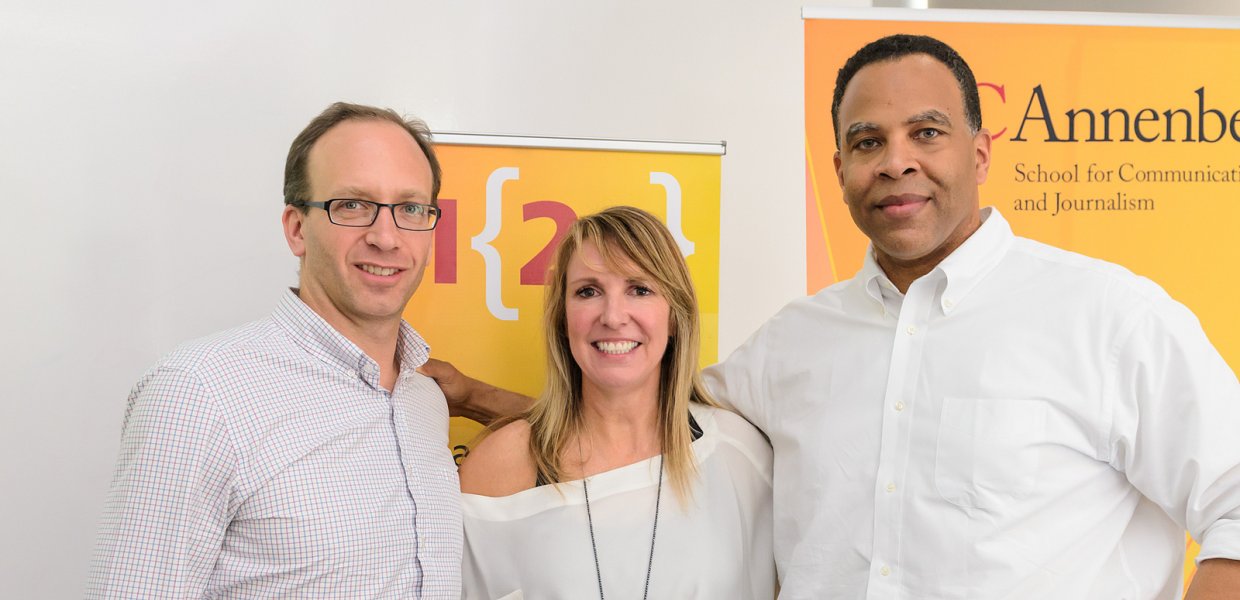USC Annenberg’s M{2e} executive-in-residence program brought in former Microsoft executive Mich Mathews, who built the tech giant’s entire global marketing function over her 22-year tenure. During the week-long program, Mathews visited classes and met with students and faculty, capping her time at USC by delivering a keynote address discussing massive shifts in the marketing field and the technological drivers behind them.
In a presentation titled “The Marketing Communications Revolution: What are the Implications?” she discussed the size of the advertising market and the trends behind changing spending patterns with about 70 students, faculty and alumni . Established marketing models are going by the wayside as brands trend toward digital — undoubtedly a reaction to the new ways in which people consume media.
With three billion people online worldwide, it would be foolish not to pursue that market opportunity.
“When it comes to marketing communication, there has been more innovation in the last several years than in the previous 50,” Mathews said. “The question now becomes, is the ad industry going to reinvent itself or is it going to wither and be replaced by something else?”
Mathews is deeply entrenched in the tech community in Southern California, as an angel investor, an advisory board member for Unilever and a bona fide digital media expert. During her time as a senior vice president and the chief marketing officer for Microsoft, she developed a deep expertise in brand strategy and identity, social and digital media, advertising, public relations, data and analytics.
The technologies and platforms she helped build at Microsoft have become the infrastructure behind this new wave of marketing opportunities for brands.
A number of marketers have even gone so far as to abandon established agency models and crowdsource their creative content. Mathews cited the example of Sony’s model for the advertising campaign around its PlayStation gaming console.
“Talent gets hired in a physical location today,” Mathews said. “But as Sony demonstrated by using MOFILM to find freelance producers for its PlayStation campaign, the idea of crowdsourcing that talent is gaining traction.”
Crowdsourced talent is one issue facing the marketing industry, but the emergence of alternative distribution channels is also a major driver in the massive resources being reallocated to digital. With mobile-friendly video platforms like YouTube, which is seeing upload rates of 300 hours per minute, and Netflix, which saw a billion hours of video streamed just last quarter, advertisers have realized that most traditional models are on their way out.
Another contributing factor Mathews discussed was the opportunity social media delivers to marketers. Not only do platforms with massive numbers of engaged users give brands unprecedented scale, these users are constantly telegraphing large amounts of data about themselves — all of which give brands unique opportunities to target specific content to specific people.
“It’s table stakes now to be on social as a brand,” Mathews said. “Brands have become their own marketers. It’s just a matter of how far you want to take it.”
It’s clear from her optimism about the future of tech that she wants innovators to take it as far as it will go and recognizes that the next-generation marketing professional will need a new, more diverse set of skills.
“We’re seeing the blurring of traditional roles as marketing and product development are becoming the same,” Mathews said. “The data and coding people are iterating and testing constantly, basically creating a feedback loop that never stops.”
While roles will continue to broaden, Mathews is quick to clarify that employers still want specialists, but the ideal candidates will be specialists in more than pre-existing traditional roles.
“This industry will favor people who are visionaries and big thinkers,” she said. “There is the engineering side of tech, but these products all need to be marketed as well, so there is always the need for strategic communications.”
“I’m an incredible optimist on what is coming,” Mathews concluded. “I am envious of you all because what you’re are stepping into is going to be so exciting.”









